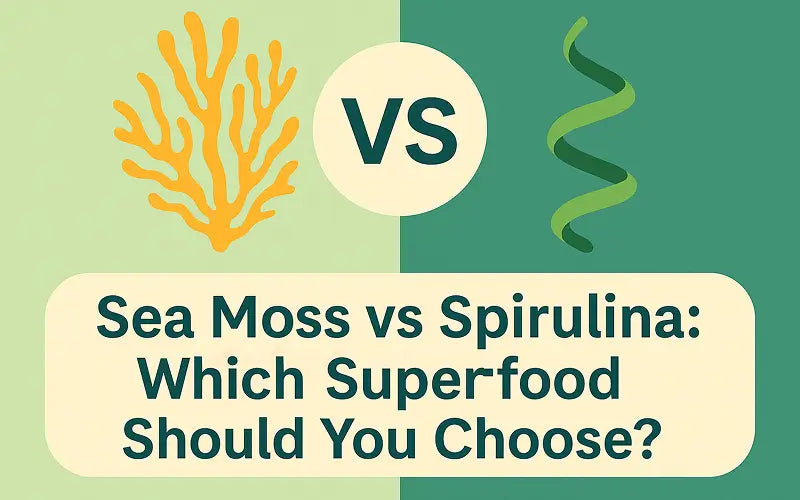Superfoods are gaining immense popularity for their impressive nutritional benefits, promising to boost health, energy, and overall well-being. Two of the most talked-about superfoods today are sea moss and spirulina. In this detailed comparison, we'll explore sea moss vs spirulina to help you understand their unique benefits, differences, and how to determine which is right for you.
What is Sea Moss?
Sea moss, also known as Irish sea moss, is a type of red algae found along the Atlantic coasts of North America and Europe. Historically, it has been consumed in Ireland and the Caribbean for centuries, valued for its extensive nutrient profile. Sea moss contains essential vitamins, minerals, and antioxidants, including iodine, magnesium, potassium, calcium, and vitamins A, C, E, and K. It is commonly available in various forms, such as gels, capsules, and powders.
What is Spirulina?
Spirulina is a blue-green algae that grows naturally in freshwater lakes and ponds. It has been consumed by humans since ancient times, with the Aztecs famously using spirulina for its nutritional potency. Spirulina is rich in protein (up to 70%), vitamins B1, B2, B3, and minerals like iron, magnesium, and manganese. This alga is particularly popular among vegans and athletes, available in tablets, powders, or smoothies.
Sea Moss vs Spirulina: Nutritional Comparison
To clearly understand sea moss vs spirulina, let's look at their nutritional differences:
|
Nutrients |
Sea Moss |
Spirulina |
|
Protein |
Moderate |
Very High |
|
Iodine |
Very High |
Low |
|
Iron |
Moderate |
High |
|
Antioxidants |
High |
Very High |
|
Vitamins |
A, C, E, K, B Vitamins |
B Vitamins |
|
Fiber |
High |
Moderate |
Health Benefits of Sea Moss
Sea moss offers numerous benefits, making it a versatile superfood:
-
Boosting Immunity: Rich in antioxidants and vitamins, sea moss supports the immune system.
-
Supporting Thyroid Health: High iodine content helps regulate thyroid function.
-
Improving Digestion: Rich in fiber, sea moss aids gut health and digestion.
-
Enhancing Skin and Hair Health: Sea moss is known for its beneficial effects on skin elasticity and hydration.
-
Reducing Fatigue: High mineral content boosts energy levels and reduces feelings of tiredness.
Health Benefits of Spirulina
Spirulina’s remarkable nutrient density delivers significant health perks:
-
Rich Protein Source: Ideal for vegetarians and vegans as a complete protein source.
-
Powerful Antioxidant: Protects against oxidative stress and inflammation.
-
Detoxification: Aids in heavy metal detoxification due to its high chlorophyll content.
-
Improving Muscle Strength: Enhances athletic performance and muscle endurance.
-
Heart Health: Helps lower cholesterol and improve heart health markers.
Combining Sea Moss and Spirulina
Interestingly, combining these two superfoods provides amplified benefits:
-
Enhanced Nutrient Density: Together, they provide a full spectrum of vitamins, minerals, proteins, and antioxidants.
-
Better Immunity: The combined antioxidants enhance your immune defenses.
-
Balanced Nutrition: Sea moss complements spirulina's protein content with its iodine and mineral richness, providing holistic nutrition.
Potential Side Effects and Safety
It's essential to consider safety and potential side effects:
-
Sea Moss: Excess iodine might cause thyroid imbalance in sensitive individuals. Digestive discomfort can occur if consumed excessively.
-
Spirulina: May contain contaminants like heavy metals if sourced improperly. Some individuals experience mild allergic reactions.
Ensure moderation and purchase from reputable sources.
Taste and Usability: Sea Moss vs Spirulina
Taste and ease of use vary significantly:
-
Sea Moss: Neutral to slightly salty taste, easily incorporated into smoothies, soups, or desserts.
-
Spirulina: Strong, earthy flavor. Best masked in smoothies, juices, or capsules.
Cost and Availability
Spirulina generally is more affordable due to mass cultivation, whereas sea moss, particularly wild-harvested Irish sea moss, can be pricier. Both are available online and in health stores. Always opt for ethically sourced products.
Irish Sea Moss vs Spirulina: Which is Best for You?
Choosing between Irish sea moss and spirulina depends on your health objectives:
-
Irish Sea Moss: Ideal for thyroid health, improved digestion, and overall mineral supplementation.
-
Spirulina: Better suited for high protein needs, detoxification, and enhanced athletic performance.
FAQs:
Can I take sea moss and spirulina every day?
Yes, both are safe for daily consumption in moderation.
Which is better for weight loss: sea moss or spirulina?
Spirulina may offer a slight edge due to its high protein content, aiding satiety and muscle maintenance.
How do I choose high-quality sea moss and spirulina products?
Always select organic, lab-tested products from reputable sources.
Are sea moss and spirulina safe during pregnancy?
Consult your healthcare provider, but moderate amounts are generally considered safe.
Final Thoughts:
Ultimately, both Irish sea moss and spirulina are powerful superfoods offering unique benefits. Whether you choose sea moss, spirulina, or both, incorporating these nutrient-rich foods into your diet can significantly boost your health.

